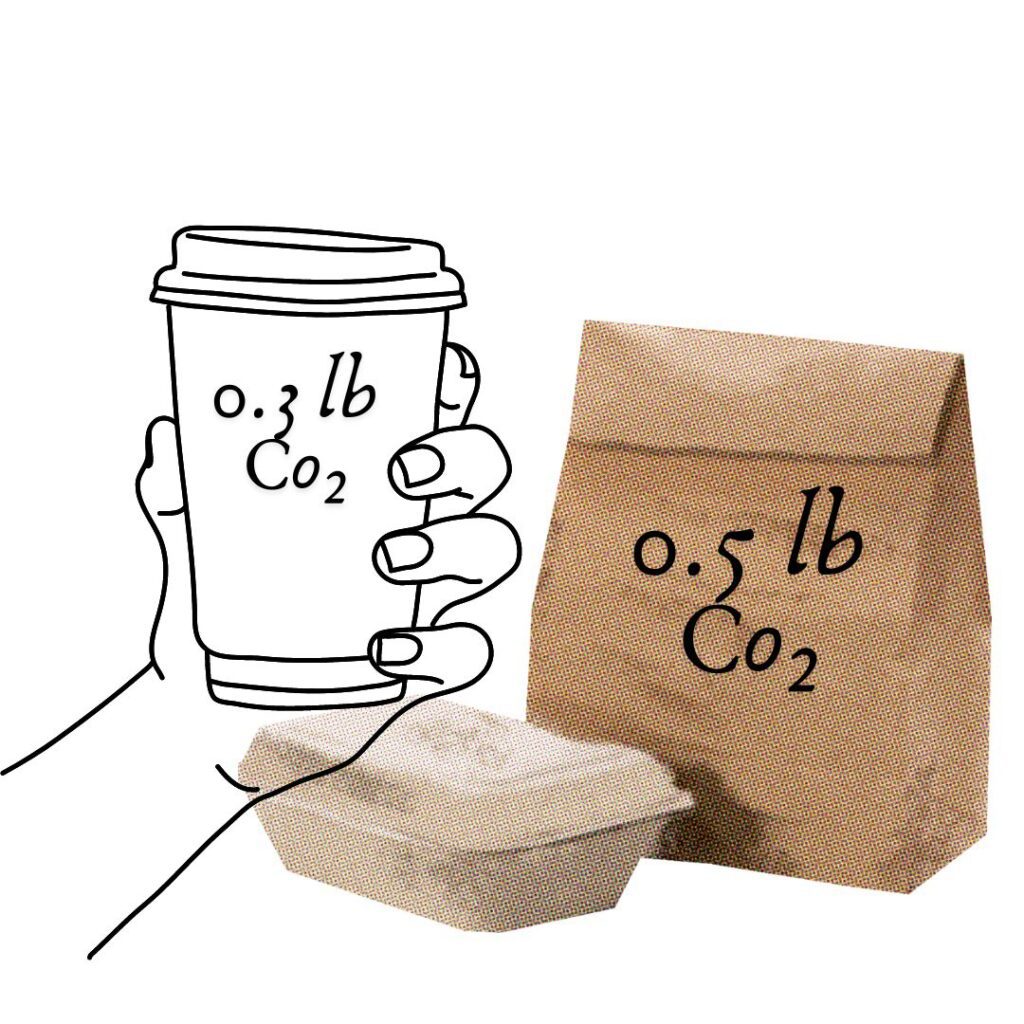Reduce Wasted Food in connecticut
Reducing wasted food is about building a responsible business that prioritizes its people, customers, and the planet.
Wasted food resources for Connecticut businesses, municipalities, organic recyclers, food relief organizations, and others.
Free Assistance to Reduce Wasted Food for Connecticut Businesses & Institutions
Our customized assistance programs help you build a workplace that values sustainability, fosters happier employees, and engages customers who share your commitment to making a difference.
Who uses the assistance?
Connecticut businesses and institutions of all sizes—such as grocery stores, restaurants, event centers, correctional facilities, colleges, universities, K-12 schools—along with municipalities, organics recycling facilities (like composting and anaerobic digestion), food relief organizations, and others, are all eligible for assistance.
“To be honest, I was skeptical at first. However, food waste diversion was so inexpensive to set up, and surprisingly, the kids quickly learned to separate edible food and food scraps from other waste. Ultimately, I’m so glad we’ve implemented this program because of its significant environmental impacts.”
Beecher Road Elementary
Kitchen Manager
“One of the defining aspects of our culture at the
ShopRite of Milford is supporting our local community
and helping our neighbors in need. That commitment
includes fighting hunger and improving our environment
to make our community a better place to live, work and
raise a family. In fact, this dedication is true not only at the ShopRite of Milford but also at every ShopRite store.”
ShopRite of Milford
Owner
“The implementation, in turn, opened our eyes to problems that we have since been able to fix, and CET’s assistance was tremendously valuable.”
Little Pub
Owner
Our Approach: Personal and Practical
Each business is unique, which is why our assistance is tailored to your specific needs. We focus on hands-on, practical strategies that can be seamlessly integrated into your existing operations.

When your business takes steps to reduce wasted food, you’re doing more than improving operations—you’re fostering a sense of responsibility among staff and customers alike.
Reducing wasted food can help ensure your business complies with Connecticut Commercial Organics Recycling Law, avoiding penalties, while engaging employees in sustainability efforts can strengthen team morale and job satisfaction. By showing your commitment to sustainability, you also attract conscious customers and build lasting loyalty.
FAQs:
The Commercial Organics Recycling Law (CGS 22a-226e) currently requires businesses generating 52+ tons of food scraps per year to recycle if within 20 miles of a facility. Upcoming changes may lower this threshold further, expanding compliance requirements. For historic details and current regulations check this information.
Approximately 40% of Connecticut’s 2.2 million tons of municipal solid waste is organic material. With limited disposal options, approximately 860,000 tons of this material is shipped out of the state to landfills, further increasing disposal costs.
By minimizing waste, reusing materials, and recycling, organizations can avoid higher disposal costs and contribute to sustainability efforts.
No, CET is a non-regulatory organization. They focus on helping businesses comply with Connecticut’s recycling laws and reduce waste, offering guidance without penalties.
Yes, CET helps businesses at any stage of their recycling efforts, offering realistic recommendations to improve waste management and environmental compliance.
CET can provide advanced strategies to reduce waste further, offering new resources and ideas to elevate existing recycling programs.

We offer customized solutions tailored to your business’s specific needs, including on-site visits, virtual consultations, and ongoing support.
FAQs:
Connecticut businesses—including grocery stores, restaurants, event centers, colleges, universities, K-12 schools, municipalities, organics recycling facilities (such as composting and anaerobic digestion), food relief organizations, and others—are eligible for assistance.
Assistance is provided at no cost to Connecticut businesses through a contract with the Department of Energy and Environmental Protection (DEEP).
Depending on the organization’s needs, we can provide a virtual visit, on-site visit, or assistance via phone and email.
During the site-visit (in-person or virtually), a waste reduction consultant will learn more about your operations and develop a list of potential solutions. Specifically, for businesses, this can include a review of your current waste contract to identify potential opportunities for efficiency and cost savings.
Furthermore, for organic recycling facilities, this could include a review of operations to determine means to improve or expand operations. Finally, we will conduct research on your behalf and deliver a report with customized recommendations for your organization, along with direct assistance to implement one or more of our recommendations.
CET can assist with recycling common materials and hard-to-recycle items like electronics, fluorescent bulbs, pallets, and food waste, including composting and donation options.
Let us help!
The results are undeniable. Businesses that partner with CET typically see a 30% reduction in wasted food, translating to stronger community impact.
Not only that, but with our no-cost assistance 9 out of 10 businesses experience cost neutrality or cost savings after implementing wasted food solutions.
Get started by filling out the form below; a CET expert will follow up with you on how we can help.
Connecticut resources
Learn, download & be a sustainable partner by sharing resources to connect businesses with assistance to reduce waste, improve their bottom line, employee job satisfaction, and respond to customer demands for sustainable practices.
Bans and beyond designing and implementing organic waste bans and mandatory organics recycling laws
Bans and beyond designing and implementing organic waste bans and mandatory organics recycling laws
City of Middletown Launches Reusable Containers Initiative
The City of Middletown, Connecticut has launched Fostering Circular Solutions for Takeout Containers, a program…
Connecticut Food Donation Made Easy
This food rescue guidance document is part of a series aimed at helping commercial food…
Connecticut Food Waste Estimation Guidance
Learn how to estimate SSOM and comply with Connecticut’s Commercial Organics Recycling Law effectively.. This…
Crossing State Lines: Getting the most out of radius provisions in food waste disposal laws
Crossing State Lines, getting the most out of radius provisions in food waste disposal laws
CT Business Assistance Textiles
Depending on the type, quantity, and quality of the textiles, businesses will have different opportunities…
DECONSTRUCTING DECONSTRUCTION: Dismantling Buildings for Reuse in Connecticut
A resource for building professionals, property managers, and building owners.
deconstruction for contractors
Learn the basics of deconstruction and hear from businesses like Urbanminers and The Green Mission…
Deconstruction in Connecticut: How to Start
A resource for developing and implementing a municipal deconstruction policy or initiative.
DMHAS Connecticut Valley Hospital Report
Connecticut Valley Hospital (CVH) is a state-owned and operated facility that is comprised of 17…
Energize CT Program Overview 2024
The ‘Energize CT Program Overview’ document provides a comprehensive summary of Connecticut’s energy efficiency and…
Food Donation by Connecticut Schools
The US EPA’s Food Recovery Hierarchy ranks feeding hungry people as a top strategy for…
Food for Thought: Choosing Between Feeding Animals, Anaerobic Digestion, & Composting in Connecticut
The Connecticut Commercial Organics Recycling Law, effective January 1, 2022, requires that commercial generators generating…
Food Scraps Diversion Guide West Hartford Public School
CET offering West Hartford Schools and DPW recommendations for implementing a district-wide food scraps diversion…
Food Waste Reduction Made Easy in CT
This food waste reduction guidance document is part of a series aimed at helping commercial…
Food Waste Separation Made Easy in CT
This food waste separation guidance document is part of a series aimed at helping commercial…
Greenwich Food Matters Challenge
In the Greenwich Food Matters Challenge, Waste Free Greenwich (WFG) and the Center for EcoTechnology…
Greenwich Food Matters Challenge
Explore how carbon-based incentives can drive sustainability and energy efficiency in this comprehensive report. Learn…
Guidance for Businesses Contracting for Trash, Recycling, and Food Waste Services
Guidance-for-Businesses-Contracting-for-Trash-Recycling-and-Food-Waste-Services